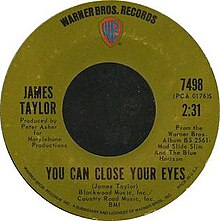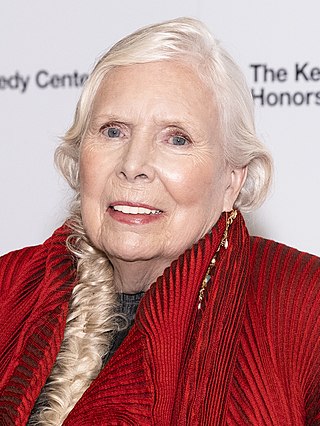
Roberta Joan "Joni" Mitchell is a Canadian-American musician, producer, and painter. As one of the most influential singer-songwriters to emerge from the 1960s folk music circuit, Mitchell became known for her starkly personal lyrics and unconventional compositions which grew to incorporate pop and jazz elements. She has received many accolades, including ten Grammy Awards and induction into the Rock and Roll Hall of Fame in 1997. Rolling Stone called her "one of the greatest songwriters ever", and AllMusic has stated, "When the dust settles, Joni Mitchell may stand as the most important and influential female recording artist of the late 20th century".
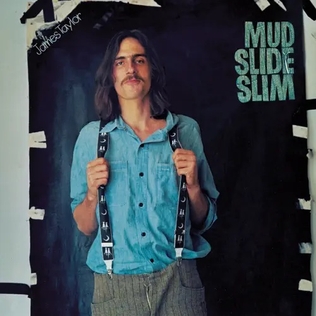
Mud Slide Slim and the Blue Horizon is the third studio album by American singer-songwriter James Taylor, released in April 1971 by Warner Bros. Records. The album was recorded between early January and late February of the same year.

"You've Got a Friend" is a 1971 song written by American singer-songwriter Carole King. It was first recorded by King and included on her second studio album, Tapestry (1971). Another well-known version is by James Taylor from his album Mud Slide Slim and the Blue Horizon. His was released as a single in 1971, reaching number one on the Billboard Hot 100 and number four on the UK Singles Chart. The two versions were recorded simultaneously in 1971 with shared musicians.
"A Case of You" is a song by Joni Mitchell, from her 1971 album Blue.
Russell Kunkel is an American drummer who has worked as a session musician with many popular artists, including Jackson Browne, Joni Mitchell, Jimmy Buffett, Harry Chapin, Rita Coolidge, Neil Diamond, Bob Dylan, Dan Fogelberg, Glenn Frey, Art Garfunkel, Nitty Gritty Dirt Band, Carole King, Lyle Lovett, Reba McEntire, Stevie Nicks, Linda Ronstadt, Bob Seger, Carly Simon, Stephen Stills, James Taylor, Joe Walsh, Steve Winwood, Neil Young, and Warren Zevon. He was the studio and touring drummer for Crosby & Nash in the 1970s, and has played on all four of their studio albums.

Letters is the fourth album by American singer-songwriter Jimmy Webb, released in 1972 by Reprise Records. Letters was a more sedate, piano-oriented album than its predecessors, and soaked in the influence of Webb's peer and eventual close friend Joni Mitchell. "I was tremendously influenced by Joni Mitchell," he admitted to Peter Doggett of Record Collector in 1994. "She was a good friend, and I was fortunate enough to be around her when she was working on For the Roses and Court and Spark. We were just part of each other's lives for a while. I definitely envied that part of her work -- the idea that this is just a conversation you're listening in on. It can still be poetry, but not self-conscious or forced poetry. I got extremely under her spell as a writer -- I still am. I used to go to the studio and listen to her record, sit quietly in the back of the control room. After the Beatles, Joni was the next big blip on my radar screen, in terms of, 'Hey, pay attention: this girl is doing something a little bit different.'" Mitchell's longtime engineer Henry Lewy also did some engineering work for Letters as well.
The Section were a US instrumental rock/jazz fusion band formed in the early 1970s by guitarist Danny Kortchmar, keyboardist Craig Doerge, bassist Leland Sklar, and drummer Russ Kunkel. Other musicians associated with the group include multi-instrumentalist David Lindley and guitarist Waddy Wachtel. They are best known for both studio and stage work in support of some of the best selling singer-songwriters and solo singers of that decade. Their frequent appearances on the records of artists signed to Asylum Records made them the label's de facto house band. Their close association with the singer-songwriter and soft rock genres of the 1970s also led to their alternate moniker of "The Mellow Mafia".

Into White is the 21st studio album by American singer-songwriter Carly Simon, released by Columbia Records, on January 2, 2007.
This article represents all other appearances that Emmylou Harris has contributed to.

“So Far Away” is a song written by Carole King, which appeared on her 1971 album Tapestry. The recording features James Taylor on acoustic guitar.
"Where You Lead" is a song written in 1970 by Carole King with lyricist Toni Stern, introduced on King's iconic 1971 album Tapestry. A Top 40 hit for Barbra Streisand in both a studio and a live version — the latter in a medley entitled "Sweet Inspiration/ Where You Lead'" — the song has also served as the main theme song for The WB dramedy series Gilmore Girls in a lyrically revised version recorded by King and Louise Goffin.
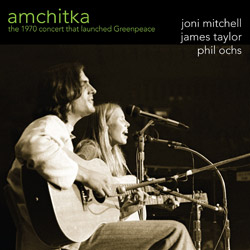
Amchitka is a 2009 two-CD release of a recording of Joni Mitchell, James Taylor and Phil Ochs performing an October 16, 1970, benefit concert at the Pacific Coliseum in Vancouver. The event funded Greenpeace's protests of 1971 nuclear weapons tests by the U.S. Atomic Energy Commission at Amchitka, Alaska.
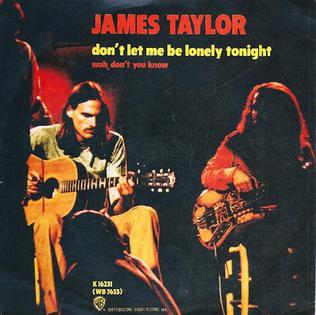
"Don't Let Me Be Lonely Tonight" is a song written and performed by American singer-songwriter James Taylor, from his 1972 album One Man Dog. The song has been included on three of Taylor's greatest-hits collection albums: Greatest Hits (1976), Classic Songs (1987) and The Best of James Taylor (2003). Taylor re-recorded the song for the 2001 Michael Brecker album Nearness of You: The Ballad Book; this rendition won Taylor the Grammy Award for Best Male Pop Vocal Performance in 2002.

"Bartender's Blues" is a song written by James Taylor and first released on his 1977 album JT. It was also released as the B-side of the lead single from JT, "Handy Man". It has since been covered by George Jones and other artists.

"Long Ago and Far Away" is a song written by James Taylor and first released on his 1971 album Mud Slide Slim and the Blue Horizon. It was the follow up single to You've Got a Friend and became a Top 40 hit in the U.S. and a Top 20 hit in Canada, and made the Top 10 on the Adult Contemporary chart in the U.S. It has also been covered by New York Voices and Johnny Mathis.
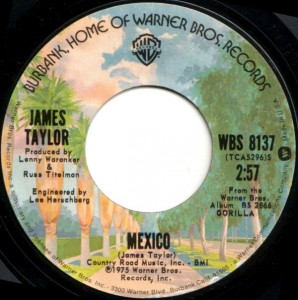
"Mexico" is a song written by James Taylor that first appeared as the opening track of his 1975 album Gorilla. It was released as a single, with the album's title track as the B-side, and reached No. 49 on the Billboard Hot 100, but performed much better on the Adult Contemporary chart, reaching No. 5. "Mexico" has appeared on many of Taylor's live and compilation albums. It has been covered by Jimmy Buffett, Alex de Grassi and Lauren Laverne.

"One Man Parade" is a song written by James Taylor that was first released as the first track on his 1972 album One Man Dog. It was also released as the second single from the album, following up on the Top 20 hit "Don't Let Me Be Lonely Tonight," after receiving significant airplay as an album track. The single was issued twice with two different B-sides, "Hymn" and "Nobody But You." It did not achieve the same chart success as "Don't Let Me Be Lonely Tonight," peaking at #67 on the Billboard Hot 100. It also charted on the Adult Contemporary chart in Canada, reaching #55. In some regions, such as in Europe, it was released as the B-side of the single release of "One Morning in May."
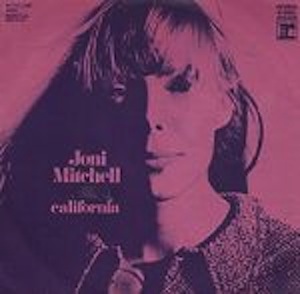
"California" is a song written by Joni Mitchell that first appeared on her 1971 album Blue. It was also released as the second single from the album, as a follow-up to "Carey".
"Highway Song" is a song written by James Taylor. It was first released by James Taylor's brother Alex Taylor on his 1971 album With Friends and Neighbors and as the lead single from the album. It was also released by James Taylor later that year on his album Mud Slide Slim and the Blue Horizon.
"I Was a Fool to Care" is a song written by James Taylor that was first released on his 1975 album Gorilla. It has also been covered by artists such as Mac DeMarco.
